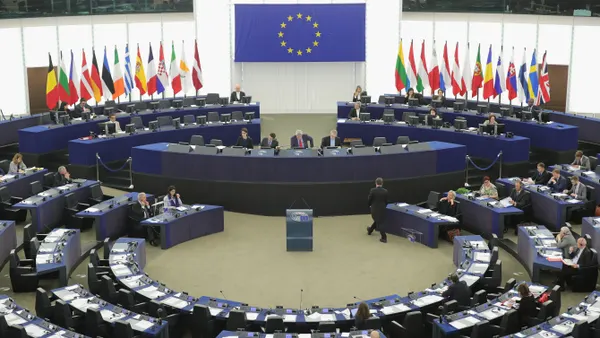Dive Brief:
- Oklahoma District Court Judge Sheila Stinson issued an order Friday to permanently block the state’s Energy Discrimination Elimination Act, a law restricting the state from working with financial firms that allegedly boycott fossil fuels.
- Oklahoma State Attorney General Gentner Drummond took over the case from State Treasurer Todd Russ and his chosen counsel after Stinson first issued a temporary injunction against the rule in May. Drummond’s office said in a July 19 press release it plans to appeal the ruling to the state supreme court.
- Prior to May’s temporary injunction blocking the law, groups within Oklahoma began to raise a red flag on unintended consequences stemming from the legislation. The state’s Republican-led legislature even weighed amending the EDEA to minimize the potential harm to state municipalities, who were experiencing increased borrowing costs due to the law.
Dive Insight:
The ruling stems from a case Oklahoma state pensioner Don Keenan brought against Russ last November. Keenan, a beneficiary of the Oklahoma Public Employees Retirement System, requested the injunction on multiple state constitutional grounds. Among the issues raised, Keenan argued the law violates an article requiring state pension plans to operate for the exclusive purpose of providing for benefits; freedom of speech; due process, as its “unconstitutionally vague;” and a pair of other statutes.
When issuing the temporary injunction in May, Stinson said that Keenan had shown a “substantial likelihood of success” in proving his claims that the law violates the exclusive benefit clause and is unconstitutionally vague. As for the latter point, Stinson said there were five separate sections of the bill that contain “conflicting and vague provisions.”
Drummond’s office was prompted to take over the case from the state treasurer’s office following Stinson’s May ruling.
“The ruling comes as no surprise given the fact that Treasurer Russ and his hand-picked legal counsel already lost the initial hearing to defend the law,” Phil Bacharach, communications director for the AG’s office, said in the release. “We plan to appeal and hope we will be able to repair the damage at the Oklahoma Supreme Court.”
Stinson’s May injunction allowed OPERS to renew its contracts with BlackRock and State Street at their prior terms, despite the two firms being present on the restricted list that Russ updates quarterly. BlackRock manages two funds for the state with assets totaling $7.3 billion, while State Street manages assets worth $808 million, OPERS Executive Director Joseph Fox told ESG Dive at the time. Barclays was the most recent firm placed on the list, added just days before the initial injunction came down.
While the state’s attorney general will continue to fight for the law, the Oklahoma Rural Association found earlier this year that the state has spent an additional $185 million and municipalities have incurred a 15.7% increase in borrowing costs since the EDEA was enacted.
Republicans in the state legislature contemplated amendments to the bill in the latest legislative session, including some that would exclude municipalities from the requirements and create an exception for state entities who could prove that divestment would lead to a “materially negative financial impact” for the divesting entity.










